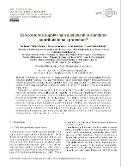Can corporate supply chain sustainability standards contribute to soil protection?

Author
Frouz, Jan
Frouzová, Jaroslava
Peterková, Alena
Kotecký, Vojtěch
Publication date
2024Published in
SOILVolume / Issue
10 (2)ISBN / ISSN
ISSN: 2199-3971ISBN / ISSN
eISSN: 2199-398XMetadata
Show full item recordCollections
This publication has a published version with DOI 10.5194/soil-10-505-2024
Abstract
Companies increasingly view soil degradation in their supply chains as a commercial risk. They have applied sustainability standards to manage environmental risks stemming from suppliers' farming operations. To examine the application of supply chain sustainability standards in soil protection, we conducted a study using global data on existing sustainability standards and their use in the food retail industry, a key sector in agrifood supply chains.Soil quality is a priority objective in retail sector sustainability efforts: 41 % of the investigated companies apply some soil-relevant standard. However, the standards lack specific and comprehensive criteria. Compliance typically requires that farmers are aware of soil damage risks and implement some mitigation measures; however, no measurable thresholds are usually assigned. This stands in contrast to some other provisions in a number of standards, such as deforestation criteria. There are two probable causes of this difference: companies and certification bodies have prioritised other environmental challenges (e.g. pesticide use, biodiversity loss in tropical biomes) over soil degradation. Also, there are practical constraints in the useful standardisation of soil sustainability. Effective soil sustainability provisions will require measurable, controllable, and scalable multidimensional interventions and compliance metrics. Often, these are not yet available. The development of necessary practical tools is a priority for future research.
Keywords
Supply chain sustainability, Corporate standards, Soil sustainability
Permanent link
https://hdl.handle.net/20.500.14178/3066License
Full text of this result is licensed under: Creative Commons Uveďte původ 4.0 International




